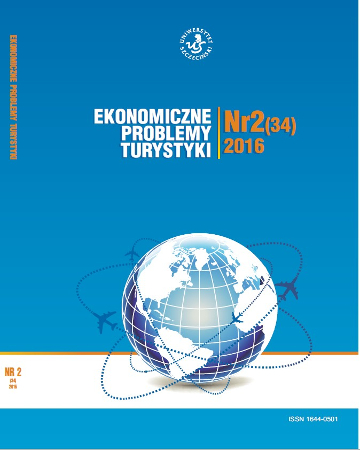
ISSN: 1644-0501
eISSN: 2353-3188
OAI
DOI: 10.18276/ept.2016.2.34-28



Lista wydań /
nr 2 (34) 2016
Zdolność do absorpcji wiedzy w przedsiębiorstwach turystycznych – identyfikacja znaczenia i możliwości pomiaru
| Autorzy: |
Marcin
Olszewski
Uniwersytet Ekonomiczny w Poznaniu Marlena Bednarska Uniwersytet Ekonomiczny w Poznaniu |
| Słowa kluczowe: | zdolność do absorpcji wiedza gospodarka turystyczna |
| Data publikacji całości: | 2016 |
| Liczba stron: | 13 (331-343) |
Abstrakt
Ze względu na dużą dynamikę zmian na współczesnym rynku turystycznym, podmioty zaangażowane w obsługę ruchu turystycznego potrzebują zasobów ludzkich zorientowanych na ciągłe podnoszenie swoich kompetencji. Zasoby wiedzy mają bowiem strategiczny charakter dla przedsiębiorstw turystycznych funkcjonujących w turbulentnym otoczeniu. Umiejętność wykorzystania wiedzy spoza organizacji jest w dużym stopniu funkcją posiadanej wiedzy i umiejętności rozpoznania wartości nowej wiedzy oraz jej asymilacji i adaptacji. Celem artykułu jest identyfikacja znaczenia zdolności do absorpcji wiedzy dla podmiotów gospodarki turystycznej, a także określenie sposobów jej konceptualizacji i operacjonalizacji w oparciu o dotychczasowe prace badawcze. Artykuł prezentuje aktualny stan badań nad zagadnieniem zdolności do absorpcji wiedzy w turystyce, a także wskazuje kierunki dalszych badań.
Pobierz plik
Plik artykułu
Bibliografia
| 1. | A. Booth, D. Papaioannou, A. Sutton, Systematic Approaches to a Successful Literature Review, Sage, London, 2012. |
| 2. | M. Brookes, The dynamics and evolution of knowledge transfer in international master franchise agreements, International Journal of Hospitality Management 2014, vol. 36, s. 52– 62. |
| 3. | W. M. Cohen, D. A. Levinthal, Absorptive Capacity: A New Perspective on Learning and Innovation, Administrative Science Quarterly 1990, vol. 35, no. 1, s. 128-152. |
| 4. | A. Escribanoa, A. Fosfurib, Josep A. Tribó, Managing external knowledge flows: The moderating role of absorptive capacity, Research Policy 2009, vol. 38, s. 96-105. |
| 5. | T. Flatten, Greve G., M. Brettel, Absorptive Capacity and Firm Performance in SMEs: The Mediating Influence of Strategic Alliances, European Management Review 2011,vol. 8, no. 3, s. 137-152. |
| 6. | B. Gallupe, Knowledge management systems: surveying the landscape, International Journal of Management Reviews 2001, vol. 3, no. 1, s. 61-77. |
| 7. | H. M. A Herath, R. Mahmood, Strategic Orientations and SME Performance: Moderating Effect of Absorptive Capacity of the Firm, Asian Social Science 2014, vol. 10, no. 13, s. 95-107. |
| 8. | H. Hoarau, Knowledge Acquisition and Assimilation in Tourism- Innovation Processes, Scandinavian Journal of Hospitality and Tourism 2014, vol. 14, no. 2, s. 135-151. |
| 9. | M. M. Jiménez-Barrionuevo, V. J. García-Morales, Validation of an instrument to measure absorptive capacity, Technovation 2011, vol. 31, s. 190-202. |
| 10. | P.-A. Julien, E. Andriambeloson, C. Ramangalahy, Networks, weak signals and technological innovations among SMEs in the land-based transportation equipment sector, Entrepreneurship and Regional Development 2004, vol. 16, iss. 4, s. 1-19. |
| 11. | W. Keller, Absorptive capacity: On the creation and acquisition of technology in development, Journal of Development Economics 1996, vol. 49, no. 1, s. 199-227. |
| 12. | L Kim, The dynamics of Samsung's technological learning in semiconductors, California Management Review 1997, vol. 39, no. 3, s. 86-100. |
| 13. | U. Kumar, V. Kumar, D.de Grosbois, Development of Technological Capability by Cuban Hospitality Organizations, International Journal of Hospitality Management 2008, vol. 27, iss. 1, s. 12-22. |
| 14. | A. Muscio, The impact of absorptive capacity on SMEs collaboration, Economics of Innovation and New Technology 2007, vol. 16, s. 653-668. |
| 15. | J. Nieves, A. Quintana, J. Osorio, Knowledge-based resources and innovation in the hotel industry, International Journal of Hospitality Management 2014, vol. 38, s. 65-73. |
| 16. | I. Nonaka, The knowledge-creating company, [w]: Harvard Business Review on Knowledge Management, Harvard Business School Press, 1998, s. 21-45. |
| 17. | L. Pace, How do tourism firms innovate for sustainable energy consumption? A capabilities perspective on the adoption of energy efficiency in tourism accommodation establishments Journal of Cleaner Production 2015, s. 1-12. |
| 18. | G. Shaw, Tourism networks, knowledge dynamics and co-creation. [w:] M. McLeod i R. Vaughan (red.), Knowledge networks and tourism, Routledge, London, 2015, s. 45–61. |
| 19. | R. Thomas, E. Wood, Innovation in tourism: Re-conceptualising and measuring the absorptive capacity of the hotel sector, Tourism Management 2014, vol. 45, s. 39–48. |
| 20. | R. Thomas, E. Wood, The absorptive capacity of tourism organisations, Annals of Tourism Research 2015, vol. 54, s. 84–99. |
| 21. | N. Tzokas, Y. A. Kim, H. Akbar, H. Al-Dajani, Absorptive capacity and performance: The role of customer relationship and technological capabilities in high-tech SMEs, Industrial Marketing Management 2015, vol. 47, s. 134-142. |
| 22. | N. Valentina, G. Passiante. Impacts of absorptive capacity on value creation, Anatolia: An International Journal of Tourism and Hospitality Research 2009, vol. 20, no. 2, s. 269–287. |
| 23. | Y. Wang, Examining the Level of Sophistication and Success of Destination Marketing Systems, Journal of Travel & Tourism Marketing 2008, vol. 24, no. 1, s. 81-98. |
| 24. | K. P. Wensley, J. G. C. Navarro, Overcoming knowledge loss through the utilization of an unlearning context, Journal of Business Research 2015, vol. 68, s. 1563–1569. |
| 25. | P. Yeoh, Realized and potential absorptive capacity: Understanding their antecedents and performance in the sourcing context, Journal of Marketing Theory and Practice 2009, vol. 17, no. 1, s. 21-36. |
| 26. | S. A. Zahra, G. George, Absorptive capacity: A review, reconceptualization, and extension, Academy of Management Review 2002, vol. 27, no. 2, s. 185–203. |
| 27. | U. Zander, B. Kogut, Knowledge and the speed of the transfer and imitation of organizational capabilities: An empirical test, Organization Science 1995, vol. 6, no. 1, s. 76-92. |